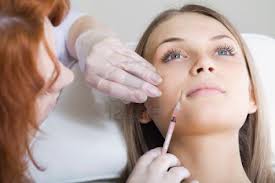 In our continuing search for the fountain of
youth, there is a new weapon. Hyaluronic acid (HA), a key component of
human tissue, aiding the body’s flexibility, mobility and moisture
retention, is emerging as a key ingredient in many anti-aging beauty
products and as a viable alternative to collagen and related substances
in injection procedures. As we age, the Hyaluronic acid levels in our
body decrease, contributing to the appearance of wrinkles, fine lines
and dryness in the skin. Hyaluronic acid beauty products and injections
can decrease the appearance of lines and wrinkles by replenishing the
body’s natural supply of Hyaluronic acid and/or by stimulating the body
to rejuvenate its own supply of HA.
In our continuing search for the fountain of
youth, there is a new weapon. Hyaluronic acid (HA), a key component of
human tissue, aiding the body’s flexibility, mobility and moisture
retention, is emerging as a key ingredient in many anti-aging beauty
products and as a viable alternative to collagen and related substances
in injection procedures. As we age, the Hyaluronic acid levels in our
body decrease, contributing to the appearance of wrinkles, fine lines
and dryness in the skin. Hyaluronic acid beauty products and injections
can decrease the appearance of lines and wrinkles by replenishing the
body’s natural supply of Hyaluronic acid and/or by stimulating the body
to rejuvenate its own supply of HA.
Among the exciting new developments in the world of Hyaluronic
acid products is the recent FDA approval of Restylane and Hylaform,
facial injections containing Hyaluronic acid. These injections can be
administered quickly and with little chance of side effect. According
to the American Society of Plastic Surgeons, more people than ever are
choosing to forgo invasive plastic surgery for less painful, less time
consuming procedures. The American Society for Aesthetic Plastic
Surgery (ASAPS) predicts that in 2005, Hyaluronic acid (Restylane,
Hylaform) will surpass collagen as the most popular soft tissue filler
for lines and wrinkles. The Society also predicts that additional
Hyaluronic acid products developed specifically for facial volume
enhancement and for improvement of depressed scars will be introduced.
Currently, Hyaluronic acid injections are most commonly used
around the mouth and on forehead wrinkles and smile lines and to
enlarge, moisturize and "plump” lips. The entire injection process
takes less than an hour, and requires repeat treatments every four
months to a year. Hyaluronic acid treatments are more expensive than
those using collagen (a syringe of Restylane or another Hyaluronic acid
product might cost up to $500 as compared to around $373 for collagen)
but HA injections last longer because they help the skin retain natural
moisture. When injected, the filler plumps up the skin by allowing it
to attract and hold water. Side effects are much less likely with
Hyaluronic acid than with collagen contributing to its attractiveness as
an alternative treatment.
The possibilities seem endless for uses of Hyaluronic acid. In
Japan, Daikin Industries is even offering an air conditioner that emits
Hyaluronic acid from the filter to moisturize skin. There are sure to
be even more innovations and future ways to take advantage of Hyaluronic
acid’s many health and beauty benefits.
About The Author
Jana Willinger
http://klopi.info Клопы